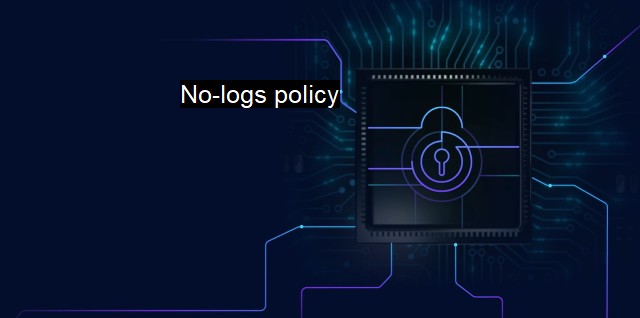What is No-logs policy?
Exploring the Importance of 'No-Logs Policy' in Cybersecurity and Antivirus: The Crucial Factor in Gaining Consumer Trust and Loyalty
The term "No-logs policy" is frequently invoked primarily relative to Virtual Private Networks (VPN). This policy straightforwardly means that your online activities are not recorded, monitored, stored, transmitted or passed to any third party. At its most absolute, a No-logs or Zero-logs policy would lead to no trace of any usage of any kind, not even the scantiest of technical matters.The No-logs policy is essential when people desire to maintain their online anonymity. When using a VPN, all data that travels from the device to the VPN server is encrypted. This encrypted connection hides the user's online activities from their Internet Service Provider and anyone else who might be looking, like hackers or screen bugs. While this offers definite security benefits, the information is still accessible to the VPN provider whose servers the data is routed through. VPN providers who institute No-logs policy ensure the user that none of their data or activities will be recorded, stored, or passed on.
This policy becomes considerably significant considering the abundance of cyber threats that exist today. Cybercriminals are becoming more sophisticated at infiltrating systems and networks. They use various methods to exploit vulnerabilities, one of which is accessing usage logs. These logs contain sensitive data about users' activities, which hackers could possibly use for nefarious purposes. Therefore, the No-logs policy is a significant barrier to these potential malicious activities.
It is also crucial to understand the varied definition of 'No-logs' applied by different VPN services. Some might assert a No-logs policy but might still collect anonymized usage statistics. Others may not retain traffic logs but might record session logs, which include connection times and used bandwidth. More favourable VPN providers would not retain data such as IP addresses, browsing history, DNS queries, metadata, and other sensitive data that could be used to trace back to a unique user.
In the world of antivirus, No-logs policy can also play a significant role. Antivirus applications function by scanning files on a device to check against a database of known malicious software. While this database doesn't usually concern the carrier about data storage or privacy, a handful of antivirus software logs the activity of users for improved app functionality and cybersecurity research. a No-logs policy safeguards that no individualised user data, user behavior, or history will be stored, providing the user peace of mind in terms of online privacy.
The potential essence of the No-logs policy is thus multifaceted. On the one hand, it ensures user privacy, a tenet integral to online freedoms, digital rights, and democratized internet. On the other hand, it helps insulate users from inadvertent exposure to security risks, given the rise in decentralized cyber threats and the raft of advanced persistent threats (APTs), finely illuminated on state actors.
Foray into digital relevance obliges cybersecurity precautions and protocols. Possibly one of the competitive advantages elucidating on why VPNs and antivirus apps with a No-logs policy are increasingly gaining in user popularity.
Everyone wants to keep things private, especially online activities. Businesses might have proprietary secrets, individuals with sensitive transactions, and journalists concerned about source protection. Considering the increasing importance of cybersecurity, an allegiance to a hardened No-logs policy ensures all users that their security and privacy don't remain merely at the mercy of an ISP or a competent hacker. Instead, it should evermore stay right within the domain where it should ideally pertain: The individual user.

No-logs policy FAQs
What is a no-logs policy?
A no-logs policy is a cybersecurity practice in which a company or service provider does not track or record any user activity or personally identifiable information. In the context of antivirus software, this means that the antivirus software does not collect, store, or share any data about its users or their devices.How does a no-logs policy benefit antivirus users?
A no-logs policy provides users with increased privacy and security, as their activity and data are not being tracked or recorded. This means that in the event of a data breach or other security incident, users' personal information and online activity will not be compromised. Additionally, a no-logs policy can help to prevent government surveillance and protect users from targeted ads and other unwanted solicitations.Are all antivirus providers committed to a no-logs policy?
No, not all antivirus providers have a no-logs policy. Some companies may track user activity and collect data for various purposes, such as marketing or improving their products. It's important to do your research and choose an antivirus provider that has a transparent and strong privacy policy.Can a no-logs policy impact the performance of antivirus software?
In some cases, a no-logs policy may impact the performance of antivirus software, as the software will not have access to data about user activity and behavior. However, many antivirus providers have found ways to maintain a high level of performance while still maintaining a no-logs policy. It's important to choose an antivirus provider that balances user privacy with effective malware detection and prevention.| | A | | | B | | | C | | | D | | | E | | | F | | | G | | | H | | | I | | | J | | | K | | | L | | | M | |
| | N | | | O | | | P | | | Q | | | R | | | S | | | T | | | U | | | V | | | W | | | X | | | Y | | | Z | |
| | 1 | | | 2 | | | 3 | | | 4 | | | 7 | | | 8 | | |||||||